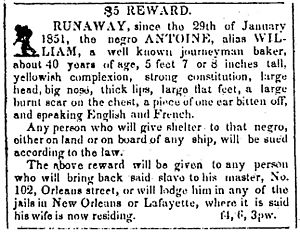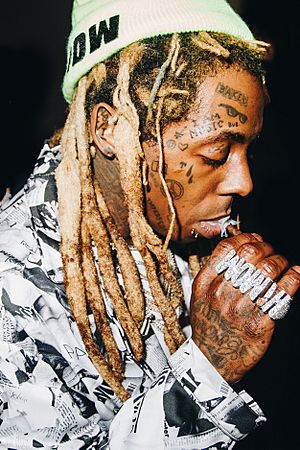African Americans in Louisiana facts for kids
| Total population | |
|---|---|
| 1,572,573 (2017) | |
| Regions with significant populations | |
| New Orleans, Baton Rouge, Shreveport, Monroe, Lafayette, Lake Charles, Alexandria, Houma-Thibodaux | |
| Languages | |
| Southern American English, African American Vernacular English, Louisiana Creole, Louisiana French, New Orleans English | |
| Religion | |
| Christianity (Predominately Protestantism and Roman Catholicism), Atheism, Louisiana Voodoo | |
| Related ethnic groups | |
| Black Southerners, African Americans, African Americans in France, French Americans, Louisiana Creole people, Cajuns, Redbones, Creoles of color |
African Americans in Louisiana or Black Louisianians are residents of the state of Louisiana who are of African ancestry.
African slaves worked on indigo and sugarcane plantations under French colonial rule in Louisiana.
Louisiana has the fifth largest African American population in the United States. Louisiana has the second largest percentage of African Americans in the country, only behind Mississippi. As of the 2020 U.S. Census, African Americans were 32.8% of the state's population.
History
The first slaves from Africa arrived in Louisiana in 1719 on the Aurore slave ship, only a year after the founding of New Orleans. Twenty-three slave ships brought black slaves to Louisiana in French Louisiana alone, almost all embarking prior to 1730. Between 1723 and 1769, most African slaves imported to Louisiana were from modern-day Senegal and Congo, many thousands being imported to Louisiana from there. A large number of the imported slaves from the Senegambia region were members of the Wolof and Bambara ethnic groups. Saint-Louis and Goree Island were sites where a great number of slaves destined for Louisiana departed from Africa. During the Spanish control of Louisiana, between 1770 and 1803, most of the slaves still came from the Congo and the Senegambia region, but they imported also more slaves from modern-day Benin. Many slaves imported during this period were members of the Nago people, a Yoruba subgroup.
The slaves brought with them their cultural practices, languages, and religious beliefs rooted in spirit and ancestor worship, which were key elements of Louisiana Voodoo. In addition, in the late nineteenth century, many Afro-Haitians also migrated to Louisiana, contributing to the Voodoo tradition of the state.
During the American period (1804–1820), almost half of the African slaves came from the Congo.
Before the American Civil War (1861 to 1865), African Americans comprised the majority of the population in the state, with most being enslaved and working as laborers on sugar cane and cotton plantations.
African Americans left Louisiana by the tens of thousands during the Great Migration in the first half of the 20th century, seeking work and political opportunities elsewhere. As of the 2010 U.S. Census, African Americans were 31.2% of the state's population.
Of all deaths from COVID-19 in 2020, African Americans in Louisiana died in greater numbers than any other racial group.
Louisiana Creoles in Louisiana are of French, Spanish, Native American, and African American ancestry. Creoles of color are Creoles with black ancestry who assimilated into Black culture. There is also an Afro-Gypsy community in Louisiana developed as a consequence of interracial marriage between freed African Americans and enslaved Roma.
Historically black colleges and universities in Louisiana
There are six historically black colleges (HBCU) established in Louisiana. The Southern University System is the country's first and only HBCU college system.
Culture
African Americans have contributed to Louisiana's culture, music, and cuisine. African slaves have influenced New Orleans dishes such as gumbo. African slaves also brought Louisiana Voodoo to the state. African Americans have influenced the music of Louisiana and helped develop jazz, blues, hip hop, R&B, Zydeco, and Bounce music in the state.
Notable people
- Lil Wayne, musician
- Anthony Mackie, actor
- Tyler Perry, actor
- Madam C. J. Walker, entrepreneur
- Louis Armstrong, trumpeter
- Bill Russell, basketball player
- Randy Jackson, bassist
- YoungBoy Never Broke Again, rapper
- Kevin Gates, rapper
- Johnnie Cochran, lawyer
- Clyde Drexler, former professional basketball player
- Mahalia Jackson, singer



